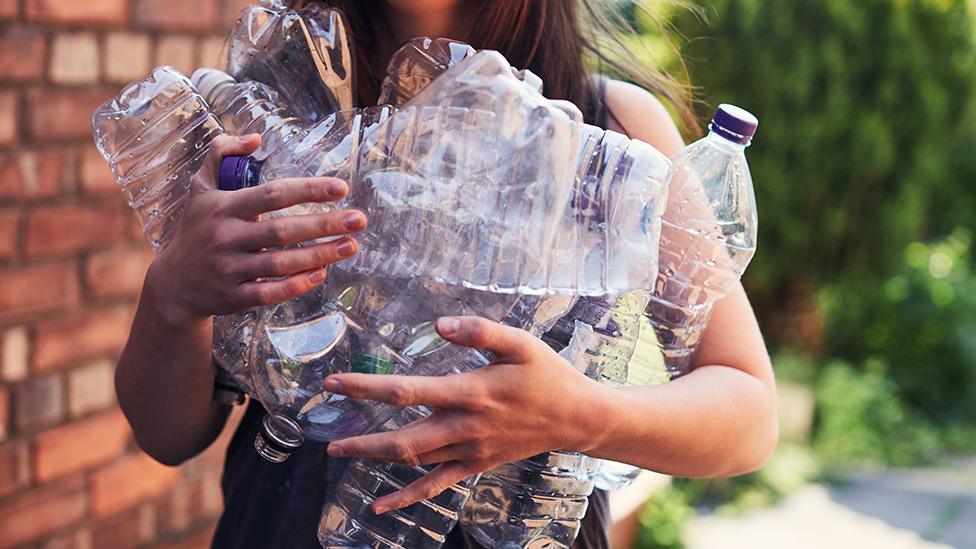Deposit return scheme 'could increase plastic waste'
- Published
- comments
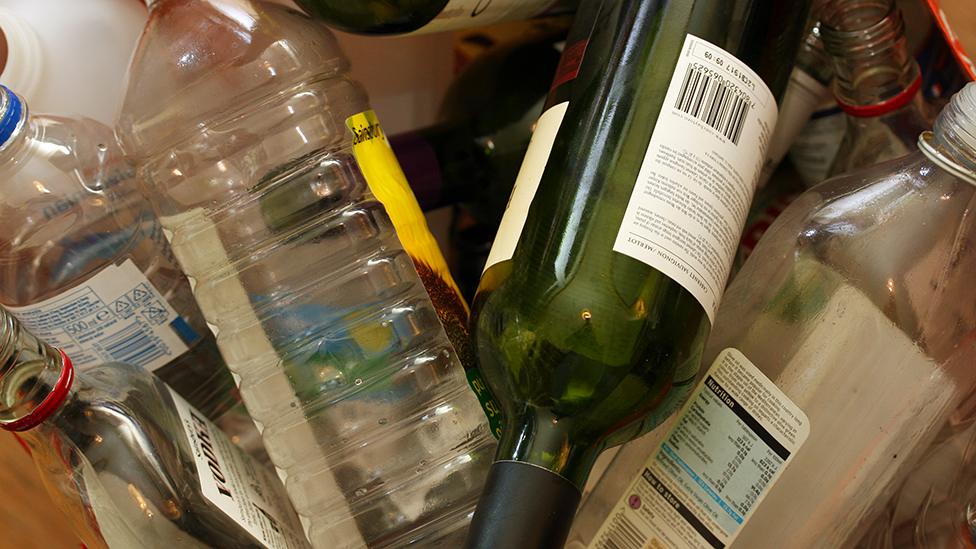
Bottles and cans, as well as plastic drinking bottles will be included in the scheme for Scotland
MSPs have been told a deposit return scheme for drinking containers could unintentionally increase plastic waste.
In May the Scottish government announced a deposit of 20p would be added to some plastic drinking containers, cans and glass.
Aluminium packaging recycling body Alupro argues the flat rate levy could have "unintended consequences".
The Scottish government said a flat rate had the advantage of simplicity which could boost uptake of the scheme.
In May Environment Secretary Roseanna Cunningham told MSPs at Holyrood that a "return to retail" model would be adopted as part of the government's climate action plan.
Consumers will be able to recoup any deposit they pay by taking their empty containers to a designated collection point.
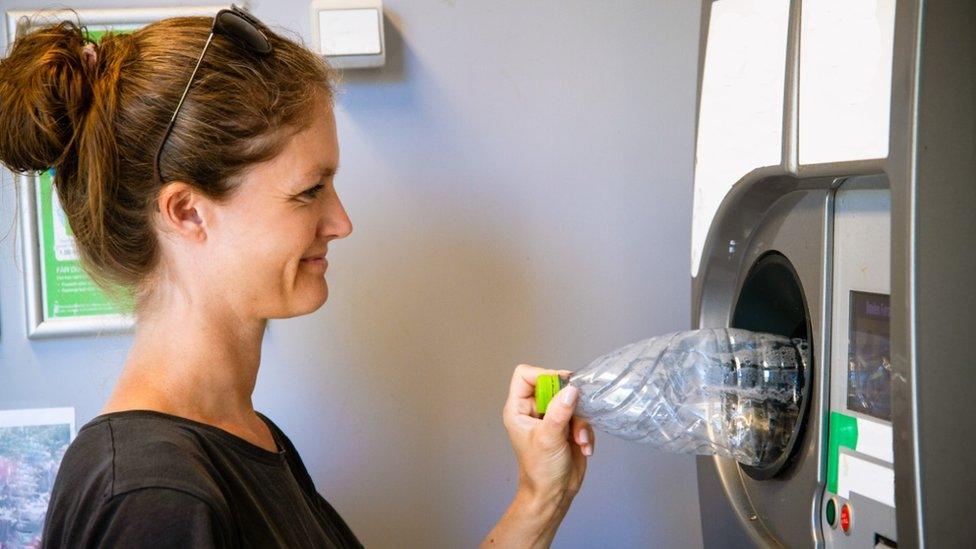
Automatic recycling machines like this one are found in every supermarket in Denmark and a similar approach is being planned for Scotland
But Alupro told MSPs on Holyrood's environment committee that a flat rate levy regardless of container size will make multipacks of cans significantly more expensive.
It claims many consumers faced with a £4.80 charge for a 24-can pack of soft drinks will instead switch to buying four two-litre bottles.
This option would contain almost the same amount of liquid but only carry a deposit of 80p.
Alupro executive director Rick Hindley, said: "The majority of consumers buy multipacks, and these will become twice as expensive as the equivalent volume in plastic if a deposit return scheme is introduced with the same deposit fee.
"This would be a significant upfront cost for household budgets and, as our survey has confirmed, it will influence purchasing habits."
Research commissioned by Alupro indicates that an "all-in" deposit measure covering containers of all materials and sizes would, if introduced across the whole of the UK, result in an extra 823 million plastic bottles being produced.
Instead Alupro is advocating a variable deposit fee based on the size of the container.
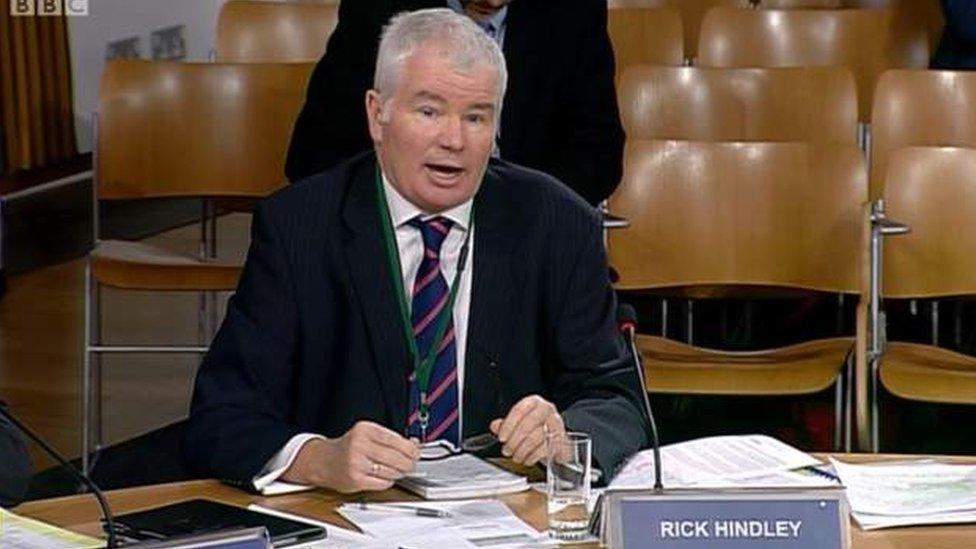
Alupro executive director Rick Hindley
British Glass has also raised concerns about the scheme amid claims the inclusion of glass will increase the cost and complexity of the system.
In an open letter the group said including glass would significantly increase the operational cost of the scheme due to the material's low value and greater weight.
Chief executive Dave Dalton said: "It will cause significant disruption to glass manufacturers, drinks companies, wholesalers, retailers, importers and the hospitality sector as well as increasing the cost of drinks in glass bottles for the people of Scotland."
Ewan MacDonald-Russell, from the Scottish Retail Consortium, welcomed the inclusion of most plastic and metal containers and the exclusion of milk containers.
But he also expressed concern about the inclusion of glass as he believes it will put too much of a burden on businesses.
Meanwhile, the Federation of Small Businesses argued that any scheme must work for the smallest retailers and producers, not just large shops and multinational drinks companies.
Susan Love, from the FSB, told the committee sandwich bars and cappuccino vans should be exempted as they have no storage space.
She also said it is unsustainable that the onus is on small businesses to come up with an alternative return point.
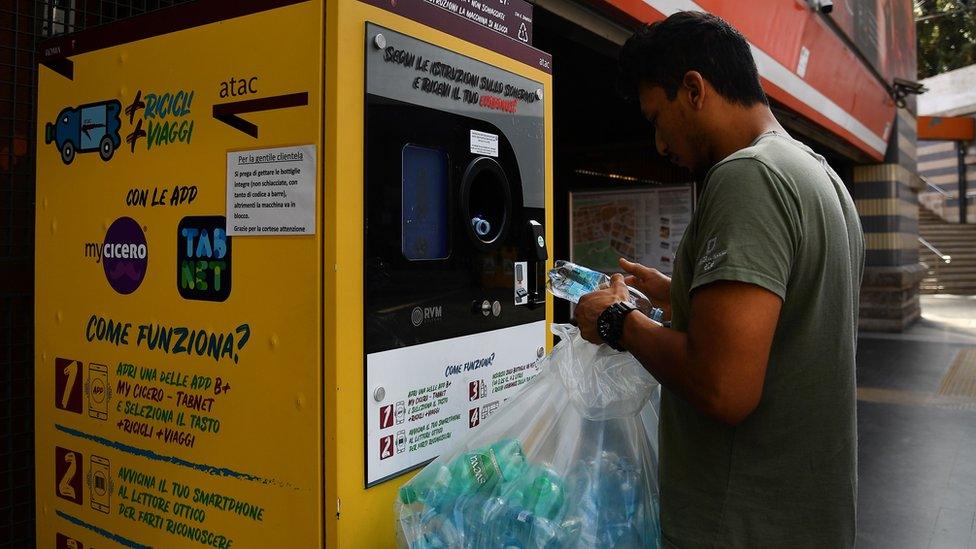
In Italy, commuters are able to trade plastic bottles for credits on the metro system
And Arran Brewery owner Gerald Michaluk claimed the scheme was "rushed, deeply flawed and open to potential fraud" and would place "a huge burden" on small firms.
Other recycling and environmental groups, however, have backed the "all-in" model being proposed, saying that charging a lower levy for smaller drinks cans would be less effective.
About 40 countries worldwide - including Germany and Sweden - operate deposit return schemes.
The Scottish government said there was little international evidence to support Alupro's concerns.
A spokesperson said: "A flat deposit keeps the system simple for consumers and our deposit rate is set to provide a strong incentive to return a wide range of containers.
"There is limited international evidence to suggest that consumer purchasing habits are likely to change significantly due to deposit return, and we are targeting a high return rate to minimise any potential effect.
"We are committed to continuing to work with industry to implement the scheme in the best way possible."
The scheme is due to launch in Scotland in 2021, although in August experts cast doubt on that timetable.

How will the scheme work and how will I get my deposit back?
The 20p deposit will, in effect, be added to the price of a single-use drinks container bought from a shop.
The consumer will get their deposit back when they return the empty bottle or can to the retailer.
All types of drinks and all containers above 50ml and up to three litres in size are included.
Businesses selling drinks which are opened and consumed on site - such as pubs and restaurants - will not have to charge the deposit to the public.
There will be two ways you can return your empty container - over the counter, or by using a reverse vending machine (RVM).
An RVM is a machine that scans containers when they are returned and then refunds your deposit.
The government says there will be a range of ways you can get your 20p back, for example cash at a till, a token or discount voucher or digitally. The returned containers are stored in the machine and are then collected for recycling.
As well as retailers and hospitality businesses, schools and other community hubs will be able to act as return locations.
- Published24 August 2019

- Published17 November 2021
